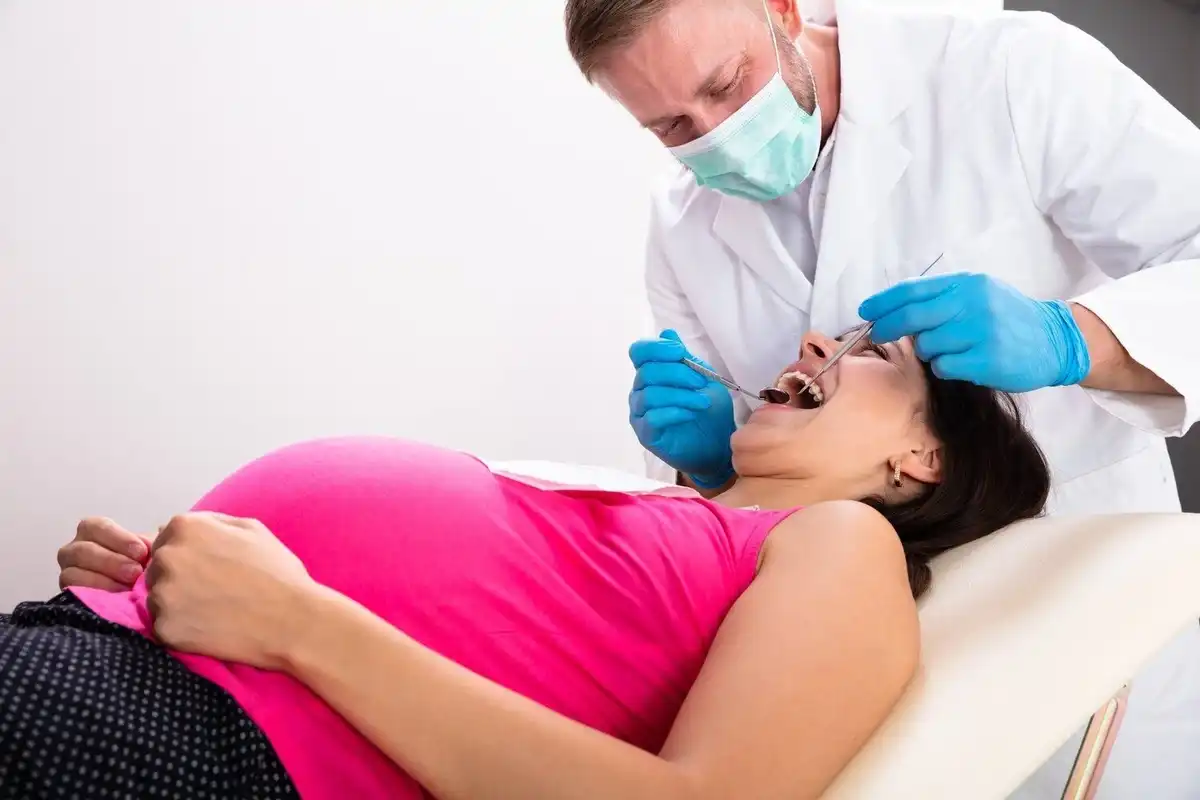Why Your Teeth Hurt During Pregnancy & What To Do About It


Struggling with sensitive teeth during pregnancy? It’s not uncommon for expectant mothers to experience a number of physical changes during their pregnancy. Teeth pain may be one of them. Some women even say that they never experienced dental problems until they became pregnant.
Pregnancy & Your Teeth
Common Symptoms
Some of the most common symptoms of pregnancy dental problems aren’t just gestation-related. They can also occur during menses, breastfeeding, and menopause. The hormonal and physical changes that occur during pregnancy can amplify already underlying teeth and gum issues.
What are some of the most common dental concerns and symptoms that pregnant women are said to experience? Conditions like:
- Bleeding gums
- Gum swelling
- Pregnancy granulomas (aka “pregnancy tumors”)
- Tooth decay (cavities)
- Some of the less common symptoms during pregnancy may also include:
- Loose teeth
- Tooth loss
- Dry mouth
- Tooth sensitivity
- Gum recession
Why does any of this matter? Because according to experts, “bad oral health in pregnancy” can significantly lead to “premature delivery, low birth weight baby, pre-eclampsia” and medical conditions that jeopardize both the health of mothers and baby.
Pregnancy isn’t a time of illness or disease. It’s a reflection of health. However, it’s completely normal for women to experience flare-ups of already underlying concerns, due to all of the changes going on inside of their bodies. Sensitive teeth during pregnancy, teeth pain, or suddenly eroding enamel aren’t caused by being pregnant; but there are definitely factors at play that can cause those issues to flare up or get worse while you’re expecting.
How To Treat Pregnancy Teeth Pain
The best treatment for painful or sensitive teeth (during pregnancy or not) is through prevention and early intervention. Most common dental problems — be they tooth decay or gum infections — can be avoided through daily home care and routine dental checkups.
Treating swollen gums or gum disease during pregnancy is the same as when you’re not pregnant:
- Brush along the gumlines with a soft toothbrush at least twice per day.
- Clean between teeth and just under the gumlines with floss at least once per day.
- Consider using an antimicrobial mouth rinse as needed.
- Continue a re-vamped oral hygiene routine for two weeks to see improvement.
If swollen gums or bleeding do not improve, you’ll want to see your dentist and hygienist. They’ll fully evaluate your gums to rule out an infection like periodontal disease. You might also need a dental cleaning to remove any tartar buildup (which can harbor bacteria and thereby make your gum health worse.)
Combining professional and at-home hygiene routines can help you eliminate sensitive, swollen gums in most cases. However, some pregnant women may continue to experience symptoms of hormone-induced “pregnancy gingivitis” throughout the remainder of their gestation. You can tell that it’s pregnancy gingivitis if you’ve never had symptoms of gum disease (bleeding, swollen gums) until you’re finally expecting - AND - if daily brushing and flossing doesn’t seem to help.
In situations where active decay (cavities) or periodontal disease are present, your dentist will need to prescribe an appropriate care plan. Your treatment could include small fillings, a deep cleaning, or other pregnancy-safe dental procedures. The key is to act quickly, before harmful oral bacteria spread through your bloodstream and across the placenta to your child.
Home Remedies
Preventative home care is your best way to remedy minor tooth sensitivity or gum swelling.
Inflammation in your gums can usually be reversed within two weeks of a dedicated brushing and flossing routine. Although irritation and bleeding will be evident at first, they should gradually subside as dental plaque is eliminated. It only takes about 24 hours for plaque to calcify into tartar buildup. By that point, it can only be removed by a dental professional. Do not attempt to clean away tartar by yourself!
NOTE: “Pregnancy tumors” on your gums will typically remain for the duration of your pregnancy. If they interfere with your diet or self-esteem, it’s possible to have them safely removed by your dentist. Most of them are fairly small, but they can become large and unsightly in extremely rare cases.
Sensitive teeth can be managed by adding a sensitivity-blend toothpaste into your homecare routine. Avoid whitening toothpastes, as they may add to your sensitivity. Use these products daily to see full results within two weeks. They work best for sensitivity caused by gum recession, enamel erosion, and generally sensitive teeth.
If you do not see an improvement within two weeks, you will need to see a dentist. Active decay may never hurt at all, so try not to use the severity of your tooth sensitivity to decide whether it’s worth going in for an exam. Even abscessed teeth may only cause mild tenderness or pain.
Cause Of Dental Pain When Pregnant
Inflamed gums — especially those with pregnancy tumors or pregnancy gingivitis — will be particularly tender when you’re brushing and flossing. Sensitive teeth during pregnancy is usually attributed to gum health. If the inflammation leads to recession (exposed tooth roots) the underlying tooth will be hypersensitive to anything that touches it. That includes a toothbrush, your favorite drink, or the foods you’re eating every day.
Sometimes changes in your saliva can also contribute to sensitive teeth during pregnancy. Dry mouth (xerostomia) means there’s less of a liquid “buffer” around your teeth. So, when they’re exposed to plaque or food residue, you might notice more irritation than normal. That doesn’t necessarily mean that your teeth are “going bad” because of your pregnancy, though. It’s just that the environment inside of your mouth is now at a state where already-existing dental problems may start to become more noticeable. The fact that you’re having pregnancy teeth pain is more coincidental than it is a consequence.
Fatigue, nausea, and other pregnancy factors are also at play. If an expectant mother doesn’t feel well, she may not be brushing and flossing as much as she did pre-pregnancy. Or perhaps she’s eating more frequently throughout the day and getting those additional acidic exposures caused by an uptake in snacking. It’s not that pregnancy is the cause of tooth pain; it’s more that these scenarios can create the “perfect storm” for sensitive teeth during pregnancy.
When To See A Dentist

Depending on what stage of pregnancy you’re in — and how severe your oral infection is — your dentist may want to communicate with your OBGYN directly. As the two co-plan your care, you can feel confident knowing you’re well looked after and that it’s safe to proceed with dental treatment.
Preventing Teeth Pain During Pregnancy
Your body is going through a ton of changes right now. Pregnancy may seem to amplify them. Since you probably have different dietary habits than you did pre-pregnancy — or you’re battling extra acid exposure due to morning sickness and heartburn — there are some things you can do to keep your teeth healthy.
1) Good Oral Health Before You Get Pregnant
Make sure you’re practicing good oral hygiene and are up to date on all of your dental appointments. Healthier mouths are associated with higher conception rates, regardless of your gender. Ensuring a healthy pregnancy starts months (and years) before you’re expecting!
2) Rinse With Water Regularly
Tap water has a neutral pH and also contains fluoride. Rinse your mouth out after every snack, sip, or bout of nausea. It’s better than immediately brushing, which can rub bacteria and acids around your mouth.
3) Up Your Fluoride Intake.
An over-the-counter fluoride rinse can remineralize weak enamel, making teeth resistant against cavities and sensitivity. For best results, rinse right before you go to bed at night (after brushing and flossing of course.) Fluoride is extremely important especially for women with severe morning sickness.
4) Schedule Your Regular Checkups
5) Treat Dental Problems As Soon As Possible
If there’s a small cavity or you’re developing signs of gum disease, do not wait until after pregnancy to treat them (unless you’re a matter of days from giving birth.) You don’t want those oral bacteria spreading into adjacent teeth or through your bloodstream. Plus, it’s easier to catch up on your dental care now than it is to juggle appointments with a newborn!
6) When In Doubt, Talk To Your Dentist
Overcoming Teeth Pain When Pregnant
Pregnancy teeth pain, swollen gums, and sensitivity mean there’s something going on inside of your mouth. But they’re not a side-effect of pregnancy, which is a completely healthy state. That being said, some people will experience problems like sensitive teeth during pregnancy because of the physical changes going on throughout their body. Most are preventable or easily treated at home. Others require the help of your dentist. Bottom line: don’t let dental problems go untreated, as they could pose a serious risk to the health of your unborn child.

Make your inbox smile!
Subscribe






